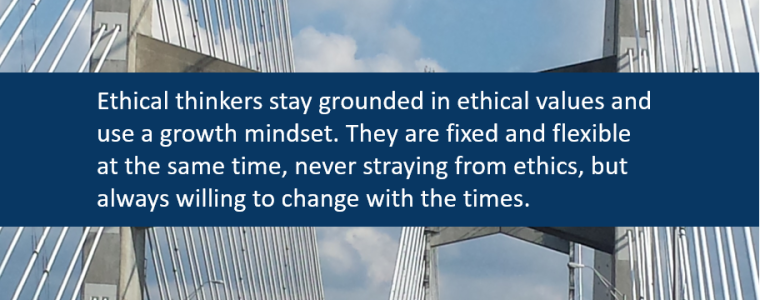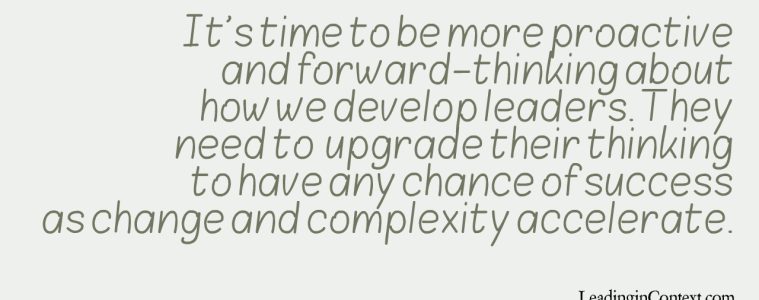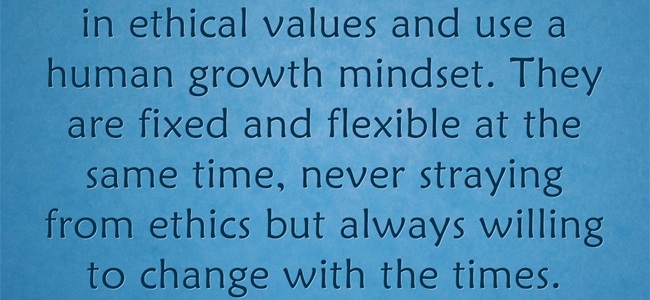By Linda Fisher Thornton Openness to learning about other cultures has become a necessary component of leadership. One way to help people respect cultural differences is to build what UNESCO calls “intercultural competence.” To accomplish this, we need an open mind, and a willingness to learn from others who do not think or live as we do.
Tag: leadership development
11 Paths to Mastering Ethical Leadership
By Linda Fisher Thornton Developing competent ethical leaders can be a huge challenge. Why is it so difficult? We live in a globally connected society, and are expected to be globally aware. We are dealing with catastrophic change and uncertainty. We fill many different roles in our organizations, industries and communities. Each role we play and each decision we face has different ethical implications. Ethical competence is definitely not something that “just happens.”
What Role Does Exclusion Play in Hate and Violence? (Part 3)
By Linda Fisher Thornton One of the thinking traps that people fall into is putting people into categories. This may result in assigning a derogatory label to the category, and making blanket statements about how "all people" from that category are a certain way.
Ethical Leadership Development: Global Principles
By Linda Fisher Thornton Beyond complying with laws and regulations, what should C-Suite leaders be doing about ethical leadership and responsible business practices? CEOs, CLOs, CHROs and other C-Suite leaders should be working together to ensure that every leader is doing business responsibly and ethically. But what does “doing business responsibly and ethically” look like in today’s global economy? In our interconnected working world, where each economy affects all others around the world, ethical business practices need to be thought about more broadly than ever before.
Ethical Leadership Development: 15 Important Elements
By Linda Fisher Thornton Since moral growth is a lifelong pursuit, moral education needs to start early, and it needs to continue throughout our professional careers. This requires quite a bit more effort than just doing an "annual ethics training." Since ethical leadership itself is multidimensional and nuanced, any ethical leadership development for leaders must be multifaceted and nuanced.
10 Quotes to Inspire Leaders in 2024 (Part 1)
By Linda Fisher Thornton This series includes 10 quotes (linked to blog posts with leadership guidance) to inspire you and help you improve your leader development as we head into the new year. Part 1 includes the first 5.
Thank Someone Who Changed Your Life
By Linda Fisher Thornton There have been several great leaders who helped me grow, and who inspired me to want to lead others. This message is for them:
Hallmarks of Ethical Leadership (Part 4)
By Linda Fisher Thornton This post is Part 4 in a series. In Part 1, Part 2, and Part 3 I explored 9 different traits that help you recognize ethical leaders. In Part 4 I will address the importance of leading in ways that eliminate fear. One of the hallmarks of ethical leadership is that it is a fear-free zone. Fear is insidious. It changes how we see the world and how we treat others. Here are 5 important reasons why fear has no place in our workplaces, our families or our communities:
Ethical Thinking and Decision Making for Leaders (Part 4)
By Linda Fisher Thornton Who we include in our ethical thinking, and how broadly we consider our responsibility to others are both important elements of ethical leadership. In Part 1 of this series, I explored the Depth of our thinking, and in Part 2, I broke down issues related to understanding Context. In Part 3, I looked at embracing Complexity. In Part 4, we’ll dig into the importance of Inclusion.
Ethics and Leadership Should Be Learned Together
By Linda Fisher Thornton Preparing leaders for ethical leadership is a long-term process. It requires careful thought about the messages we are sending. For example, what message are we sending when we separate ethics training from other leadership training?
Ethical Leaders Care (Part 3)
By Linda Fisher Thornton Demonstrating care is one of the hallmark requirements of good leadership. In addition to caring about what happens in our own careers, we must CARE about people, about their success, and about creating a positive work environment. If leaders don’t seem to care, that numbs the organization’s culture, disabling the natural systems that would prevent and identify ethical risks.
Building an Ethical Culture (Part 2)
By Linda Fisher Thornton One of my favorite concepts for understanding how social media is changing the visibility of organizational culture is Trendwatching.com’s report Glass Box Brands. As Trendwatching.com eloquently explains, “In an age of radical transparency, your internal culture is your brand.” The key point I take away from this important report is that we can no longer assume that our culture is private. In fact, it’s completely public and it defines our brand.
Advancing Ethics in Your Organization (Part 4)
By Linda Fisher Thornton The focus of this week’s post is on Ways to Inspire Leaders to Lead With Positive Ethical Values. Here are 3 ways to inspire leaders to reach for positive values – that also help you “do good” in your organization, community and world.
Advancing Ethics in Your Organization (Part 3)
By Linda Fisher Thornton The first post in this series addressed ACCOUNTABILITY. The second asked you to evaluate your IMPACT. This week's four ways to advance ethics in your organization focus on MANAGING THE SYSTEM.
Advancing Ethics in Your Organization (Part 2)
By Linda Fisher Thornton The first post in this series addressed ACCOUNTABILITY. In this second post we’ll take a look at IMPACT. Here are 3 ways to Advance Ethics that also improve the impact of your organization and your leadership.












